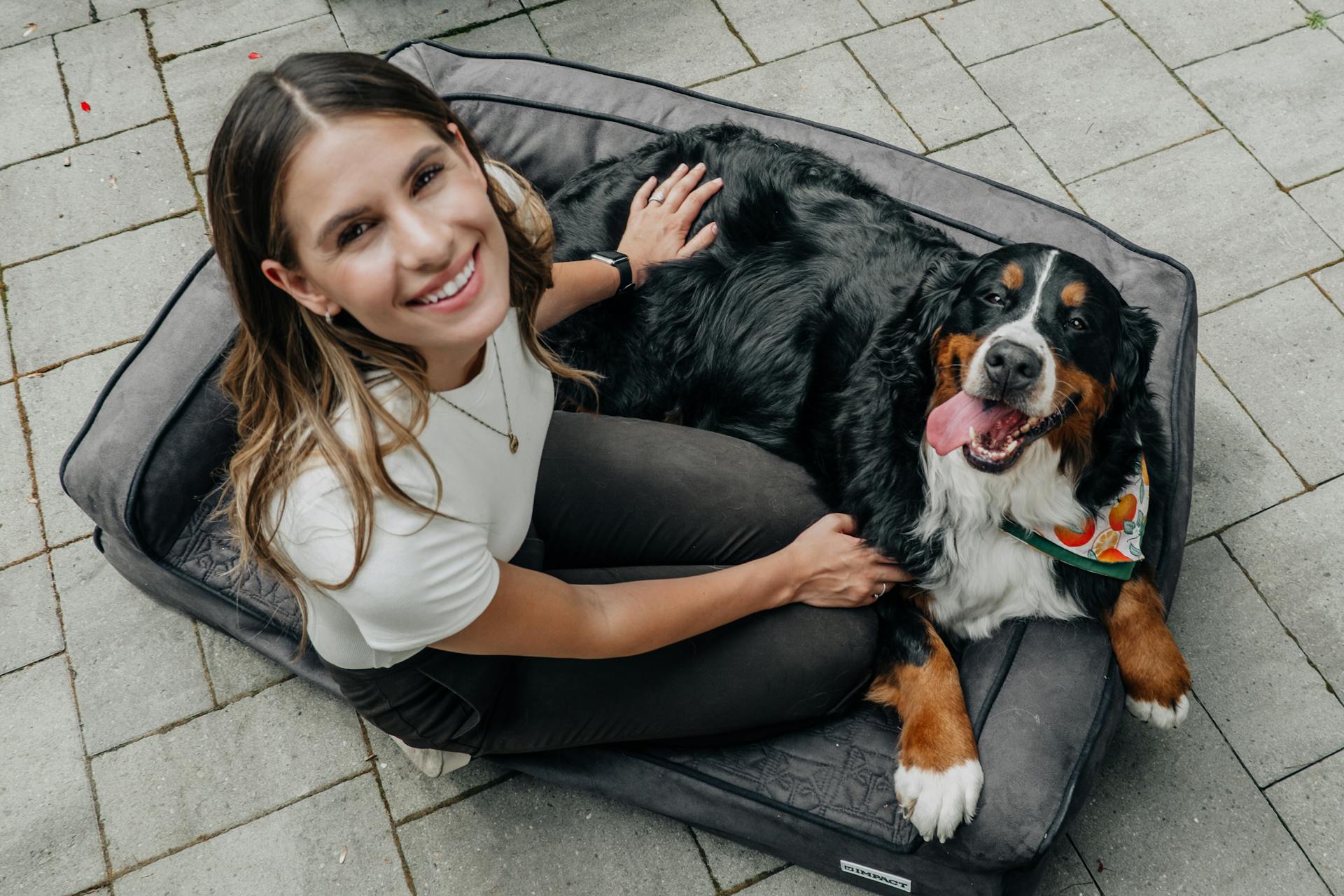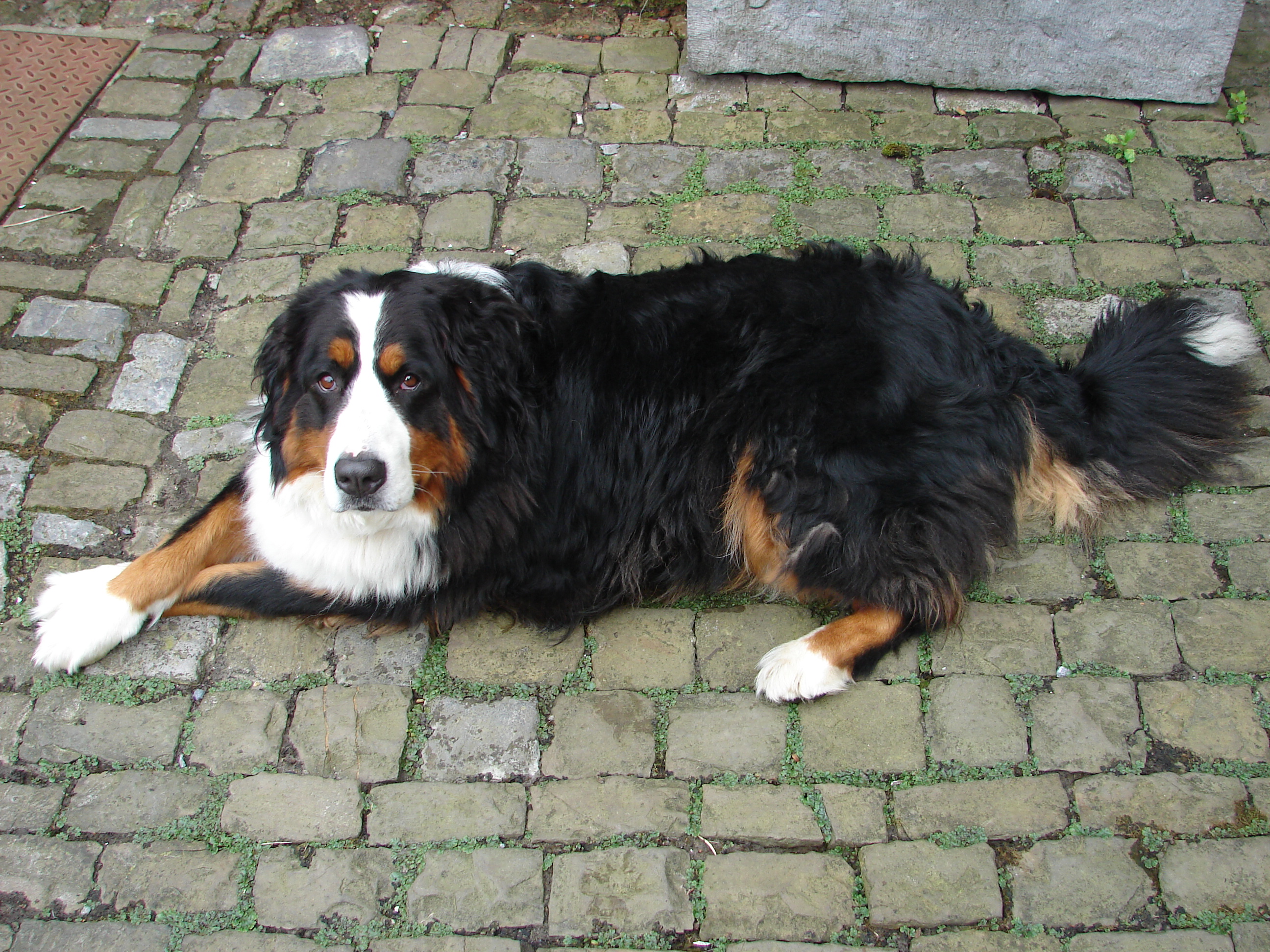
Female Bernese Mountain Dogs are known for their gentle and affectionate nature, making them a great addition to many families. They are naturally protective of their loved ones, but they are not generally aggressive.
These dogs are large, with females weighing between 80-120 pounds and standing 23-27 inches tall at the shoulder. This size requires regular exercise to keep them happy and healthy.
Female Bernese Mountain Dogs are also prone to certain health issues, such as hip dysplasia and elbow dysplasia, which can be managed with regular veterinary check-ups and a healthy diet.
Take a look at this: Bernese Mountain Dog Hip Dysplasia
Calm and Affectionate
One of the most wonderful traits of a female Bernese Mountain Dog is her calm and affectionate nature. She's good-natured and eager to please her humans, making her a joy to be around.
They thrive on attention and love to cuddle, so be prepared for lots of snuggles and kisses. With proper socialization and training, they do well with children and other pets, making them a wonderful addition to any family.
Their calm demeanor makes them an excellent choice for people of all ages, and they're generally friendly toward strangers, other dogs, and other pets. They may even surprise you with their playful side, but they're not excessive barkers, so you don't have to worry about noise complaints.
Their size and strength can be a challenge for children or the elderly to manage, but with the right care and attention, they can be a loving and loyal companion.
Care
A female Bernese Mountain Dog's large size requires a home and transportation that can accommodate her without being forced into cramped spaces.
Her thick double coat repels dirt and insulates her from the cold, but it sheds a lot, especially when the weather changes in the spring and fall. This breed is ideal for those who don't mind fur around the house.
She needs access to soft bedding to prevent callouses and bursitis, and regular exercise, such as walking or playing, for about an hour during the cool parts of the day. Consistent training and socialization are also crucial for her happiness and health.
Brushing is essential to remove loose fur and prevent mats and tangles, especially during shedding season. Daily brushing is recommended, and weekly brushing is a must.
A monthly bath is sufficient, but check her ears weekly for dirt, redness, swelling, or smell, and clean them as needed. Dry her ears thoroughly after swimming or bathing to prevent infections.
She's prone to overheating in the summer, so keep her inside during really hot days. And, be prepared for some slobbering, especially if she has loose jowls.
Readers also liked: When Can a Female Dog Get Pregnant during Heat
Puppy Growth Guide 4-8 Months
At 4-8 months, your female Bernese Mountain Dog puppy will likely weigh around 45-85 pounds, with larger males potentially weighing more. Puppies at this age start to lose their milk teeth between 4-5 months, which can lead to intense chewing or mouthing.
Chewing on objects like furniture or electric cords is common, but you can redirect their attention to toys. If you catch your puppy chewing on something she shouldn't, give her a toy to play with and praise her for focusing on the toy instead.
See what others are reading: Bernese Mountain Dog 8 Weeks Old
Puppies also start to lose their puppy coats around 4-5 months, and you may notice lots of puppy fuzz in the brush when grooming. Don't be surprised to see a strip of shiny, coarser-looking black coat running down the center of your dog's back as she transitions to her adult coat.
As your puppy grows, it's essential to continue socializing and training her. Bernese Mountain Dogs are often easy-going and tractable as babies, but that doesn't mean they don't need direction and training. Spending time teaching your dog self-control is crucial, especially as she grows into a larger dog.
Growth spurts can be uneven, and your puppy's rear quarters may appear higher for a week or longer before the front quarters catch up. This is not a cause for alarm, and your puppy will eventually develop into a well-proportioned adult.
Check this out: Dog Names Female Start with S
Health and Wellness
As a female Bernese mountain dog owner, it's essential to be aware of the potential health issues that can affect your furry friend. Bernese mountain dogs have relatively short lifespans, typically ranging from seven to 10 years.
Hip and elbow dysplasia are common genetic abnormalities that can cause joint issues in Bernese mountain dogs. Your vet can provide guidance on treatment for these conditions.
Female Bernese mountain dogs are prone to certain health issues, including blood disorders like Von Willebrand's disease, which affects blood clotting. This can lead to lethargy, weight loss, and decreased appetite in affected dogs.
Here are some common health issues that can affect female Bernese mountain dogs:
- Hip and elbow dysplasia
- Blood disorders (e.g., Von Willebrand's disease)
- Cancer (e.g., histiocytic sarcoma)
- Progressive retinal atrophy
- Bloat
Common Health Problems
Bernese mountain dogs are prone to certain health issues that can impact their quality of life. One of the most significant concerns is their relatively short lifespan, ranging from seven to 10 years.
Hip and elbow dysplasia are genetic abnormalities that can cause joint issues. These conditions are inherited, so it's essential to work with a reputable breeder who prioritizes health testing.
Blood disorders, such as Von Willebrand's disease, can affect this breed. This condition prevents blood from clotting properly, which can lead to serious health complications.
Check this out: Female Dog with Blood in Urine

Cancer is another significant health risk for Bernese mountain dogs, with histiocytic sarcoma being the most common type. Symptoms can vary depending on the affected area, but often include lethargy, weight loss, and decreased appetite.
Progressive retinal atrophy is a degenerative eye disease that can cause blindness. This condition is a result of the retina deteriorating over time.
Bloat is a potentially life-threatening condition that occurs when the stomach twists and fills with gas. Eating too quickly can trigger this condition, and a surgery called gastroplexy can help prevent it.
Here's a list of the common health issues affecting Bernese mountain dogs:
- Hip and elbow dysplasia
- Blood disorders (Von Willebrand's disease)
- Cancer (histiocytic sarcoma)
- Progressive retinal atrophy
- Bloat
Cons
Bernese Mountain Dogs can be a handful when it comes to their heavy shedding. This means you can expect to vacuum frequently and brush their coat daily.
Their short life span is a sad reality, with an average lifespan of around 6-8 years. This is shorter than many other breeds, so be prepared for a relatively short time with your furry friend.

Some owners have reported that Bernese Mountain Dogs tend to drool a bit, so you may need to get used to wiping up slobber.
If you live in a warm climate, their heavy coat may not be the best fit. They're built for cooler temperatures, so be prepared for them to overheat if you live in a hot area.
Having access to a yard is a must for Bernese Mountain Dogs, as they need space to roam and exercise. Without a yard, you'll need to provide regular walks and playtime to keep them happy and healthy.
Here are some key cons to consider:
- Short life span
- Heavy shedding
- Some drool
- Heavy coat isn't good for warm climates
- Best to have access to a yard
Ownership and Adoption
If you're considering bringing a female Bernese Mountain Dog into your life, you'll want to know about the ownership and adoption process.
You can check local animal shelters and breed-specific rescue organizations for a Berner in need of a home.
If you're looking for a breeder puppy, be prepared to pay around $2,000 to $3,000, though this can vary depending on bloodline and other factors.
For resources on finding a breeder or rescue organization, check out the Bernese Mountain Dog Club of America's Breeder Directory and BMDCA Rescue & Rehome.
Adopt or Buy
If you're considering bringing a Bernese Mountain Dog into your life, you have two main options: adopt or buy.
You can check local animal shelters to find a Berner in need of a home.
Many people have found wonderful companions by adopting from shelters, and it's a great way to give a loving home to a dog that really needs one.
If you're looking for a breeder puppy, expect to pay around $2,000 to $3,000, though this can vary depending on bloodline and other factors.
You can also check the Bernese Mountain Dog Club of America Breeder Directory or BMDCA Rescue & Rehome for resources to find a breeder or rescue organization.
Some people may prefer the idea of buying from a reputable breeder, but either way, it's essential to do your research and find a responsible and caring source.
Related reading: Home Remedies for Female Dog Bladder Infection
First Steps for New Owners
As a new owner, it's essential to understand that your puppy will rely on you to provide direction and establish a routine.
The first few weeks with your puppy will revolve around getting them used to your house's schedule, including planned feeding times and a housebreaking routine. Crate training can also be beneficial, but it's not mandatory.
Puppies need to learn what is expected of them, and human touches are a big part of that. Gentle handling, such as examining or brushing teeth, feeling legs and paws, touching the ears, belly rubs, and touching the rear quarters and testicles, will teach your puppy to be comfortable with human touches.
Teaching your puppy to enjoy human touches will make future grooming tasks, like trimming nails and bathing, much easier. A tepid bath with a mild dog shampoo every 3-4 weeks, or as needed, is the correct care for your puppy's coat.
For more insights, see: Will Shiba Inu Hit 1 Cent
Frequently Asked Questions
How big can a female Bernese Mountain Dog get?
A female Bernese Mountain Dog typically grows to be between 23-26 inches tall and 70-95 pounds in weight.
What is the personality of a female Bernese Mountain Dog?
Female Bernese Mountain Dogs are known for their loving and kind nature, but may exhibit more mood swings than males, making them less predictable. They are a unique and lovable breed that requires attention to their emotional needs.
Is it better to get a male or female Bernese Mountain Dog?
There is no clear-cut answer, as both male and female Bernese Mountain Dogs have unique characteristics that may suit different owners. However, female Berners tend to mature faster and learn quicker, but may be more independent.
Do female Bernese mountain dogs live longer?
Female Bernese mountain dogs have a significantly longer life expectancy than males, with a notable survival advantage observed in a study of 389 dogs. Research suggests that females in this breed may live longer due to various factors, including differences in gonadectomy status.
Do Bernese mountain dogs pick one person?
Yes, Bernese mountain dogs often form a strong bond with one family member, whom they consider their "alfa." This special bond is a key characteristic of the breed's loyal and affectionate nature.
Sources
- https://www.britannica.com/animal/Bernese-mountain-dog
- https://www.dogster.com/lifestyle/facts-about-bernese-mountain-dogs
- https://www.thesprucepets.com/bernese-mountain-dog-4427890
- http://www.bmdinfo.org/bernerpedia/Bernese_Mountain_Dog_Puppy_Growth.php
- https://bouboumania.net/images/phocadownload/GIFS/Morphologie.pdf
Featured Images: pexels.com


